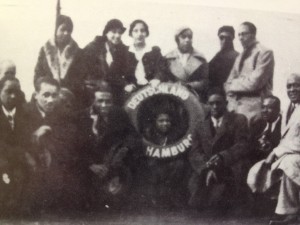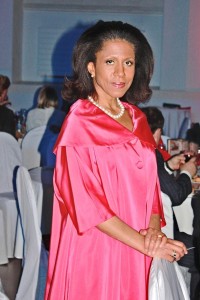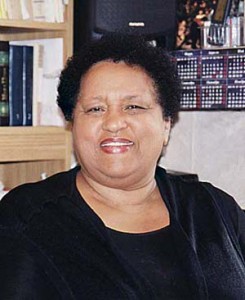GOOD MORNING, P.O.U.!
We continue our series on Afro-Russians.
DR. LILY GOLDEN
(1934-2010)
Activist and Scholar
Dr. Lily Golden studied at the prestigious Moscow State University, earning the Russian equivalent of a Ph.D. in African-American History. She later worked at the African Institute of the Soviet Academy of Sciences and the Institute of African Studies and eventually became its director. In 1988 she moved to United State and in 1993 became a distinguished scholar in residence at Chicago State University where she remained until 2002.
Golden was born in July 1934 in Tashkent, Uzbekistan to the union of Oliver Golden and Bertha Bialek. Golden’s father, Oliver, was an African-American communist and an agronomy expert who specialized in cotton growing. He was educated at the Tuskegee University and was a student of the renowned professor of agronomy, George Washington Carter. Her mother, Bertha, also a communist was the youngest daughter of a New York-based Jewish family of Polish origin.
The couple met at a Manhattan police station holding cell. They had both been arrested during a

union demonstration in Manhattan. They struck up a conversation while awaiting bail. When Bertha’s parents came to bail her out, she pleaded with them to pay Golden’s bail as well, introducing him as her “new friend.” Her shocked parents refused. Married in 1920, the couple found that they faced racism on all sides. They spent more and more time engaged in Communist party activities. Bertha’s parents disowned her for marrying an African-American or Black man. Oliver and Bertha moved to the then Soviet Republic of Uzbekistan in 1931.
Years later, after Oliver had settled with his wife in Uzbekistan, he recruited 16 other African-American cotton growers in the quest for freedom in a “country of the coloured people”. According to Golden, Uzbeks were considered coloured by the then standards in America. “Some white and black Americans had to go back home, and those who stayed had to adopt Russian names and later became assimilated, following Stalin’s decree in 1937 mandating foreigners to either apply for Soviet citizenship or quit,” says Golden, adding: “Obvious American names would have sounded suspicious in an anti-capitalist regime.”
Golden’s paternal grandfather, Hilliard Golden, was an African slave freed in Mississippi in 1865. He married a Native American woman and had 10 children. Hilliard soon became one of the wealthiest black landowners in Mississippi, but had to flee the notorious Ku Klux Klan who twice burned his home and crops.
Golden, with her unusual combination of African-American, Native American, Jewish and Russian ancestry, has become a tower of strength for those fighting against racial bigotry. In her book, My Long Journey, she described herself as: “I belong to all races. I am African-American, a Polish Jew and a Red Indian who became Russian in everything but blood.”
In My Long Journey, Golden wrote about her life as a dark-skinned Russian surviving in and struggling against turbulent changes. Golden also talked about her mixed ancestry with pride and dismisses racial supremacists as “myopic buffoons playing on a stage they know nothing about”. Illustrating her point, she says: “My daughter, Yelena’s identity is even more complicated, because she is me plus an African father from Zanzibar, himself a mixture of different kinds of blood.”
Golden’s daughter, Yelena Khanga, is a Journalist and a writer. She is also a graduate of the prestigious Moscow State University. Yelena is the author of Soul to Soul: The Story of a Black Russian American Family, 1865-1992, as well as numerous newspaper articles that detail her experiences in her native land and abroad. Yelena’s father was Zanzibari nationalist, Kassim Hanga, who became one of the masterminds of the January 1964 revolution in Zanzibar. The Western media alleged that Golden was somehow involved with the coup.
In Time Magazine’s January 24, 1964 article title Zanzibar: The Cuckoo Coup, Vice President Kassim Hanga was described as, “a bitter Zanzibari with a Russian wife, a Moscow education, and a violent hatred of the U.S. Last November, when the Parliament moved to express formal regret over President Kennedy’s death, Hanga walked out in protest.”
Hanga had met his future wife, Golden, in 1957 at the Moscow International Youth Festival. They married three years later after he returned to Moscow to study economics at the then newly-opened Peoples’ Friendship University, named after the assassinated Congolese prime minister, Patrice Lumumba. Hanga completed the five-year university program in just one year, but stayed stayed in Russia for a while. He returned home and took part in writing Zanzibar’s independence constitution in London. Hanga mysteriously disappeared soon after. Golden had seen him last in Moscow, when he had gone there straight from London after helping write Zanzibar’s independence constitution. In her book, Golden says, “though we maintained occasional correspondence, it was the last time I saw him, reportedly due to political tensions at home”. In 1968, Golden found out that her husband was killed for allegedly betraying the ideals of the cause of the revolution.
Golden won the affection of the Soviet leadership and became the “brain behind,” according to Western propaganda, President Nikita Khrushchev’s policy of exporting revolutions to Africa. “At least, this is how the capitalist world thought I was,” Golden noted in her book. In those days, Western newspaper headlines such as “Lily Golden, the brain behind Khrushchev’s revolution exports” were typical of what she now calls “hostile headlines in the late 1950s and early 1960s”.
Golden documents that she was influenced by her association with renowned African-American pan-African activists such as W.E.B. Du Bois, singer Paul Robeson and others; her alliance with the Kremlin, and her involvement with the emerging leaders of independent Africa.
Golden made several trips to America thereafter and in 1988 decided to stay. For the next 15 years, she became famous as a black Russian activist, fighting for minority causes and racial harmony.
She went back to Moscow in 2003 to be close to her then newly-born granddaughter by her daughter Yelena, who, in the intervening years, had become Russia’s most popular black television host.
Golden was an active member of the board of directors of both the Russian-African Business Council and the San Francisco-based Center for Citizen Initiatives. She was also the vice-president of the International Charity Foundation in Chicago, and a member of the New York-based International, Intercultural Black Women’s Studies Institute. She has represented these organizations several times at the UN.
Dr. Lily Golden died on December 6, 2010 at the age of 76.
(SOURCE: Alliance of Professional Africans in the Diaspora)
YELENA KHANGA
Writer, Television Personality
 Yelena Khanga (also known as Elena Hanga) was born on 1 May 1962 and raised in Moscow, USSR, and came to the United States in 1990 to write (with Susan Jacoby) Soul to Soul: The Story of a Black Russian American Family: 1865-1992 ([1]). Khanga divides her time between New York City and Moscow
Yelena Khanga (also known as Elena Hanga) was born on 1 May 1962 and raised in Moscow, USSR, and came to the United States in 1990 to write (with Susan Jacoby) Soul to Soul: The Story of a Black Russian American Family: 1865-1992 ([1]). Khanga divides her time between New York City and Moscow
Ancestry

The daughter of Abdullah Kassim, the first vice-president of Zanzibar (assassinated in 1964)[1] and Lily Khanga (pronounced Han-ga), a historian and educator (née Golden). Yelena’s American maternal grandmother was of Polish-Jewish descent and worked as a Russian-English translator for a Soviet news agency. She also claimed to be distant relative to well-known violinist Arnold Steinhardt (her grandmother was the cousin of his father). Her African-American maternal grandfather, Oliver Golden, had a college degree in agronomy from the Tuskegee Institute but was unable to find any work in his field in the USA, and moved to the USSR (Uzbekistan) with his wife to develop the cotton industry there.
Career
Yelena Khanga was the moderator of the Russian television talk show The Domino Effect ([2]). She also moderated Russia’s first talk show about sex titled About That (Russian: Про это, Pro Eto (1997–2000)), which tackled such matters as H.I.V./AIDS, homosexuality and workplace sexual harassment; she later commented that the effect of the show “was like a bomb went off.”[2]
She was also a performer with a comedy group in Brighton Beach called Kanotye.
(SOURCE: Wikipedia)

